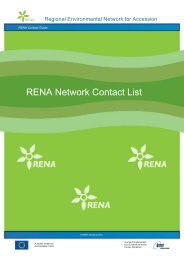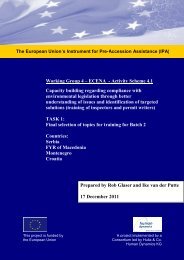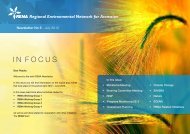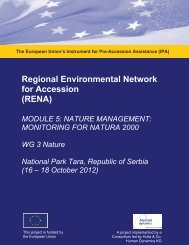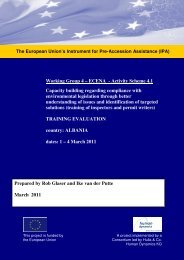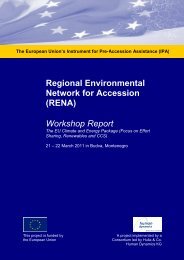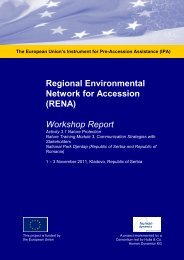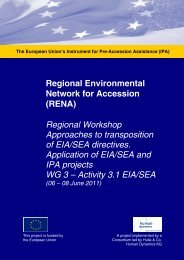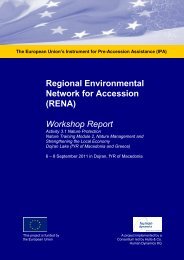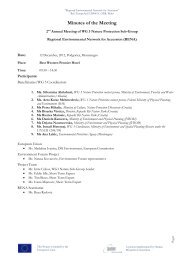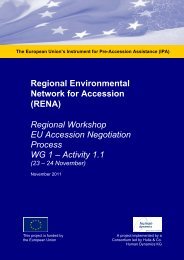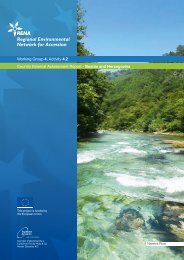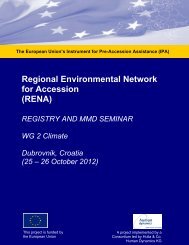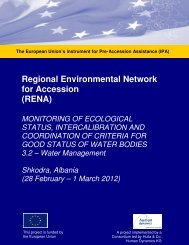3rd Interim report September 2011- March 2012.pdf - Renanetwork.org
3rd Interim report September 2011- March 2012.pdf - Renanetwork.org
3rd Interim report September 2011- March 2012.pdf - Renanetwork.org
Create successful ePaper yourself
Turn your PDF publications into a flip-book with our unique Google optimized e-Paper software.
“Regional Environmental Network for Accession”<br />
Ref: EuropeAid/128906/C/SER/Multi<br />
A question was raised by Ms. Anita Pokrovac Patekar on the evaluation and feed back of activities in<br />
the Second <strong>Interim</strong> <strong>report</strong>.<br />
It was explained by Mr. Ike van der Putte and Ms. Ruza Radovic that every training activity has a<br />
feedback based on standardized evaluation forms. An evaluation <strong>report</strong> is produced for each activity<br />
with inclusion of the feed back results. The evaluation <strong>report</strong>s are included in the separate CD of the<br />
interim <strong>report</strong> and are placed on the RENA website.<br />
There is a strong recommendation of Ms. Anita Pokrovac Patekar that everything considering feedback<br />
or evaluation should also be included in the main body of the text.<br />
Ms. Madalina Ivanica recommended that the interim <strong>report</strong> will include a specific heading on the<br />
evaluation of activities.<br />
In this respect it was added by Ms. Ivanica that the RENA secretariat was asked to perform an<br />
evaluation of all activities, in order for the EC to have more in depth analysis on what has been done<br />
up to now with a qualitative and quantitative overview of the activities.<br />
Mr. Dragoljub Todic asked what the level of awareness and knowledge is of third parties on RENA as<br />
the project should be considered of importance also for NGOs and the business sector.<br />
Mr. Van der Putte answered that this is a strong point because more and more regulations are putting<br />
specific responsibilities to the business sector. However, the RENA budget is not allocated for the<br />
business sector as a stakeholder.<br />
Mr. Metodija Sazdov commented that these kinds of trainings and initiatives can also be <strong>org</strong>anized by<br />
chambers of commerce which role is to help the industry<br />
Ms. Madalina Ivanica explained that the project is capacity building for the Ministries in the beneficiary<br />
countries. Other stakeholders can be invited to the activities but on their own expenses.<br />
Protection of Environment through Implementation of Criminal Environmental Law<br />
The aim of Mr. Mihail Dimovski’s presentation was to discuss to what extent combating environmental<br />
crime should be considered as a priority and how to integrate implementation of the EC<br />
Environmental Crimes Directive in RENA activities. Another item was to discuss follow up and<br />
synergies with WG4. Mr. Dimovski emphasized that transposition of the EU Acquis does not always<br />
ensure proper implementation in reality and that there are a lot of weaknesses in the enforcement of<br />
environmental law. Activities related to combating environmental crime activities should be covered<br />
under WG1 and WG4. Under WG1 a regional training on environmental crime has been conducted.<br />
There are also more activities planned to be conducted under WG1 in the period from <strong>September</strong><br />
<strong>2011</strong>-<strong>March</strong> 2012, such as the second regional workshop for CLP and REACH Regulations.(note: both<br />
the environmental crimes directive and the REACH and CLP regulations are subjects that can be<br />
selected in the WG 4 training programmes for inspectors and permit writers).In addition a third<br />
regional workshop on the INSPIRE Directive has been <strong>org</strong>anised and an Annual RISP meeting is<br />
planned for defining further activities.<br />
IMPEL activities with specific reference to transfrontier shipment of waste (TFS)<br />
Mr. Enes Srndic gave a brief explanation on the background of IMPEL, on who the involved<br />
authorities and <strong>org</strong>anizations are and also on the objectives and strategic aims of IMPEL. The IMPEL<br />
– TFS (Trans Frontier Shipment of waste) is one of the three clusters of the IMPEL programme. The<br />
activities are related to enforcement projects on transfrontier waste transport via seaports and roads.<br />
Furthermore attention is paid to risk assessment and also to the development of supporting tools for<br />
inspectors. In his presentation Mr. Srndic explained how his Ministry performed the verification<br />
process of waste destination and treatment in countries of destination. He also provided illustrative<br />
figures on number and types of violations.<br />
Mr. Sazdov asked about protective equipment for inspectors doing field inspections. Mr. Srndic<br />
answered that there is special equipment available but that in addition there are also special experts who<br />
are carrying out analyses to assess whether it is safe for inspectors to continue with inspection.<br />
Page3<br />
This Project is funded by the<br />
European Union<br />
A project implemented by Human<br />
Dynamics Consortium



